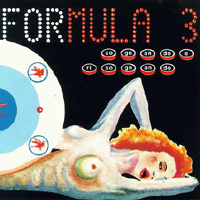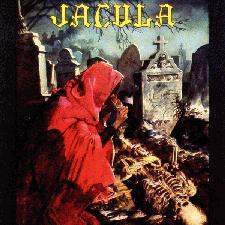 On this
page we’re examining music that doesn’t fully qualify as progressive
rock, although it participated fully in the movement. The obvious place
to begin is with Formula Tre and their third album, Sognando E Risognando
(from the title of a Lucio Battisti song heard at the start of the album), which
came out in 1972. It is often represented as progressive, and all commentators
agree that it is their best. Yet a progressive categorization is probably
not the most conducive thing for understanding Formula Tre’s
music. They were always straight-up rock, lush and exciting. Sure their
sound was pretty advanced, but that was because they were all virtuouso
rock instrumentalists. Take for example the drummer Tony Cicco, who provided
some distinctive vocals and supplied an extraordinarily full percussion
sound to the trio. When he put out his solo album under the “group”
name Cico in 1974, it turned out to be pop music with little or no trace
of the progressive. Guitarist Alberto Radius and keyboardist Gabriele
Lorenzi later formed the backbone of the top-flight progressive outfit
Il Volo. But that band was short lived, and Radius then made his way as
a singer-songwriter. Sognando E Risognando contains some of the
finest Italian rock music of the period, but you appreciate it best when
you realize that it is still fairly confined, just like the rest of this
band’s output.
On this
page we’re examining music that doesn’t fully qualify as progressive
rock, although it participated fully in the movement. The obvious place
to begin is with Formula Tre and their third album, Sognando E Risognando
(from the title of a Lucio Battisti song heard at the start of the album), which
came out in 1972. It is often represented as progressive, and all commentators
agree that it is their best. Yet a progressive categorization is probably
not the most conducive thing for understanding Formula Tre’s
music. They were always straight-up rock, lush and exciting. Sure their
sound was pretty advanced, but that was because they were all virtuouso
rock instrumentalists. Take for example the drummer Tony Cicco, who provided
some distinctive vocals and supplied an extraordinarily full percussion
sound to the trio. When he put out his solo album under the “group”
name Cico in 1974, it turned out to be pop music with little or no trace
of the progressive. Guitarist Alberto Radius and keyboardist Gabriele
Lorenzi later formed the backbone of the top-flight progressive outfit
Il Volo. But that band was short lived, and Radius then made his way as
a singer-songwriter. Sognando E Risognando contains some of the
finest Italian rock music of the period, but you appreciate it best when
you realize that it is still fairly confined, just like the rest of this
band’s output.
 The band
Aktuala put out a handful of albums in the period of the Itaprog classics,
and the Aktuala musicians are said to have been much respected. The music
on their eponymous album of 1973 has little or nothing to do with rock,
however. Few of the standard instruments are used, rather one hears a
wide array of traditional instruments of differing provenance. When there
is a guitar, it is nylon stringed; when there is a flute, it is a recorder
or tin whistle. Experimental percussion abounds, much of it sounding African
or Arabian. Zithers, dulcimers and even viols are used as much for their
tonal capabilities as for their percussive effects. This music doesn’t
qualify as jazz, either, for there are no diatonic shifts. The occasional
key change usually brings a thematic change, leaving an impression of
discontinuity, which the percussion happily batters away for us. A nice
relaxing record, this is more like New Age music than anything else. In
some places it essays briefly into a formalistic minimalism.
The band
Aktuala put out a handful of albums in the period of the Itaprog classics,
and the Aktuala musicians are said to have been much respected. The music
on their eponymous album of 1973 has little or nothing to do with rock,
however. Few of the standard instruments are used, rather one hears a
wide array of traditional instruments of differing provenance. When there
is a guitar, it is nylon stringed; when there is a flute, it is a recorder
or tin whistle. Experimental percussion abounds, much of it sounding African
or Arabian. Zithers, dulcimers and even viols are used as much for their
tonal capabilities as for their percussive effects. This music doesn’t
qualify as jazz, either, for there are no diatonic shifts. The occasional
key change usually brings a thematic change, leaving an impression of
discontinuity, which the percussion happily batters away for us. A nice
relaxing record, this is more like New Age music than anything else. In
some places it essays briefly into a formalistic minimalism.
 I hesitated
for quite a long while, but I now feel that Tardo Pede In Magiam
Versus by Jacula must be recognized for what it is. After all,
why keep a good thing to oneself? Jacula is not really progrock, and the
cover representation of a ghoul munching on joints of decaying flesh is
only one of several indications of its unprogressive nature. In this case
we are talking about the Black Mass more or less. The predominant pipe
organ of Jacula is well rooted in the works of late romantic organ masters
– one imagines Reger and Widor. If anything it is more interesting
than those classical composers. The artificial atmosphere of unrelieved
and sometimes gnawing tedium is much the same, though, and passages of
‘light relief’ featuring female vocal, harpsichord, drums, etc.,
thrive in that atmosphere. You don’t call music like this ‘progressive’.
And yet it coincides happily enough with the birth of Itaprog, having
come out in 1972. My guess is that there is a socio-musical comment somewhere
here, having to do with the addiction of the masses to American pop and
British rock, and the often farcical emulation by Italian musical icons
interested primarily in money, or worse, the popular mainstream. In any
event, a bracing and refined product.
I hesitated
for quite a long while, but I now feel that Tardo Pede In Magiam
Versus by Jacula must be recognized for what it is. After all,
why keep a good thing to oneself? Jacula is not really progrock, and the
cover representation of a ghoul munching on joints of decaying flesh is
only one of several indications of its unprogressive nature. In this case
we are talking about the Black Mass more or less. The predominant pipe
organ of Jacula is well rooted in the works of late romantic organ masters
– one imagines Reger and Widor. If anything it is more interesting
than those classical composers. The artificial atmosphere of unrelieved
and sometimes gnawing tedium is much the same, though, and passages of
‘light relief’ featuring female vocal, harpsichord, drums, etc.,
thrive in that atmosphere. You don’t call music like this ‘progressive’.
And yet it coincides happily enough with the birth of Itaprog, having
come out in 1972. My guess is that there is a socio-musical comment somewhere
here, having to do with the addiction of the masses to American pop and
British rock, and the often farcical emulation by Italian musical icons
interested primarily in money, or worse, the popular mainstream. In any
event, a bracing and refined product.
 Circus 2000
put out two LPs – an eponymous one in 1970, and An Escape From
A Box (Fuga Dall’involucro) in 1972. The first has ten tracks,
and it extends the Italian beat idiom into the realm of the psychedelic
(– a useful if deplorable term). The second has only five, correspondingly
longer tracks; and the tendency is to infer that it has moved beyond psychedelic
into the realm of progressive, especially since it is of the same essential
quality as so many fine records that were coming out then. But to term
this album progressive would be a serious mistake. It does not pretend
to the progressive, rather it explores the pyschedelic and tries to supply
ultimate artistic forms to the genre. The vocalist Silvana Aliotta rises
to this occasion, even if the forms are less suited to her style than
the more “poppy” songs she was hitherto known for. The guitarist
Marcello Quartarone is in fine fettle: all the psychedelic trappings are
there, heaps of tremolo, reverb and echo on frumpy guitar riffs that are
impressively exploratory and difficult.
Circus 2000
put out two LPs – an eponymous one in 1970, and An Escape From
A Box (Fuga Dall’involucro) in 1972. The first has ten tracks,
and it extends the Italian beat idiom into the realm of the psychedelic
(– a useful if deplorable term). The second has only five, correspondingly
longer tracks; and the tendency is to infer that it has moved beyond psychedelic
into the realm of progressive, especially since it is of the same essential
quality as so many fine records that were coming out then. But to term
this album progressive would be a serious mistake. It does not pretend
to the progressive, rather it explores the pyschedelic and tries to supply
ultimate artistic forms to the genre. The vocalist Silvana Aliotta rises
to this occasion, even if the forms are less suited to her style than
the more “poppy” songs she was hitherto known for. The guitarist
Marcello Quartarone is in fine fettle: all the psychedelic trappings are
there, heaps of tremolo, reverb and echo on frumpy guitar riffs that are
impressively exploratory and difficult.
 One of the
strangest Italians bands of the era was Flea, who seem to have devoted
their entire existence to avoiding the production of progressive rock,
yet still may be mentioned in the same breath with the classic bands.
They emerged in 1970 as a fake English group with the lurid name Flea
On The Honey using silly English pseudonyms. I haven’t heard that
one, but supposedly it strives to look beyond Italian beat music, though
not all that far. By 1972, however, they had shortened their group name
to Flea, had divulged their Italian identity, and were playing an advanced
hard rock at a high skill level. It is a bit like Led Zeppelin for jazz
fans, but if anything it’s heavier! Indeed, heavy metal music long
before such existed. The first side of this album, entitled Topi O
Uomini?, is one long tune that has some nice compositional development.
Finally, the band reemerged in 1975 as Etna, playing a highly acceptable
if not especially remarkable form of fusion jazz-rock! Throughout these
metamorphoses there was no change of personnel. As a rule, fusion music
like Etna is distinct from progressive rock, and the Flea record of 1972
cannot rightfully claim to be an artifact of Itaprog. Yet this extraordinary
group of musicians functioned perfectly well in that artistic milieu.
One of the
strangest Italians bands of the era was Flea, who seem to have devoted
their entire existence to avoiding the production of progressive rock,
yet still may be mentioned in the same breath with the classic bands.
They emerged in 1970 as a fake English group with the lurid name Flea
On The Honey using silly English pseudonyms. I haven’t heard that
one, but supposedly it strives to look beyond Italian beat music, though
not all that far. By 1972, however, they had shortened their group name
to Flea, had divulged their Italian identity, and were playing an advanced
hard rock at a high skill level. It is a bit like Led Zeppelin for jazz
fans, but if anything it’s heavier! Indeed, heavy metal music long
before such existed. The first side of this album, entitled Topi O
Uomini?, is one long tune that has some nice compositional development.
Finally, the band reemerged in 1975 as Etna, playing a highly acceptable
if not especially remarkable form of fusion jazz-rock! Throughout these
metamorphoses there was no change of personnel. As a rule, fusion music
like Etna is distinct from progressive rock, and the Flea record of 1972
cannot rightfully claim to be an artifact of Itaprog. Yet this extraordinary
group of musicians functioned perfectly well in that artistic milieu.